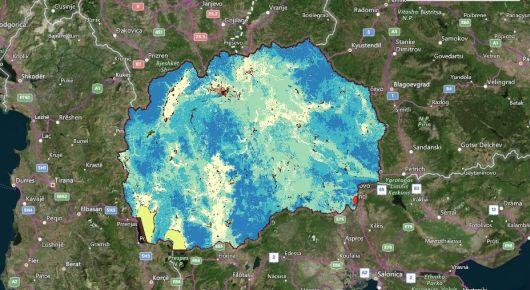Agro-ecological analysis should improve agricultural productivity in North Macedonia

Improving productivity, increasing climate resilience of agricultural production, and making better informed policies in North Macedonia is now easier thanks to the establishment of national agro-ecological zones and an agro-environmental information system.
This has been the main goal of a two-year Technical Cooperation Programme-funded project of FAO and the Macedonian Ministry of Agriculture, Forestry and Water Economy, concluding with a workshop today in Skopje. Nearly 40 representatives of key ministries, national agencies, farmer associations, academia, civil society, international partners, and the media came together to learn about the first agro-ecological zoning in the country and the benefits for farmers and policymakers.
Agriculture is an important contributor to North Macedonia’s economy, yet the sector is characterized by lower productivity compared to the European Union (EU) average. Climate variability, especially early frosts, drought and floods, causes severe damage to agricultural production and affects rural livelihoods and food security. As an EU candidate country, North Macedonia needs to approximate agriculture policy design and its implementation to EU standards, including aligning direct support measures with nationally defined targets and overall EU objectives.
To address these issues, FAO worked with the Ministry, other relevant national institutions, and the academia, to develop a state-of-the-art information and analytical system and national capacity based on FAO’s agro-ecological zoning methodology. It involves the assessment of land resources based on soil and climatic characteristics, and provides an outlook on crop suitability and productivity for over 10 commodities across different geographical regions in the country.
All of this is now publicly accessible online. Policymakers, farmers, scientists, and businesses can use information on land characteristics such as soil quality, topography, weather, agricultural land use, yield, and profitability to formulate optimal policies for sustainable agricultural production per production region. Land characteristics can be further evaluated for their production potential, which leads to making recommendations regarding “what” should be grown and “where.”
“The first agro-environmental database and web platform containing latest agro-ecological products and maps for North Macedonia is an important product that will better inform agricultural policies at the national level and, consequently, will help reduce climate risk through enhanced adaptation to climate change and promote the commercialization and selected value chain development at local level,” stressed Trajan Dimkovski, Minister of Agriculture, Forestry and Water Economy, in opening the workshop.
“Agro-ecological zones specific to crops, soil, and climatic conditions present a useful evaluation of the country’s agricultural potential in productivity and market competitiveness and provide a tool for regional and environmentally sustainable development planning for sustainable food systems,” said Fang Cheng, FAO economist. “North Macedonia is the first Balkan country that has conducted an agro-ecological assessment, which is a continuation of joint efforts of FAO and the Macedonian Government to improve agricultural monitoring and land-use planning, production systems, and national policies based on modern technologies.
Looking to the future, Cheng expressed hope for continued collaboration. “The agro-ecological zoning is opening opportunities to modernize food and agriculture policymaking in the country, as a first step towards the establishment of a modern and comprehensive monitoring and information system for food and the agri-environment in the country.”
6 December 2019, Skopje, North Macedonia
